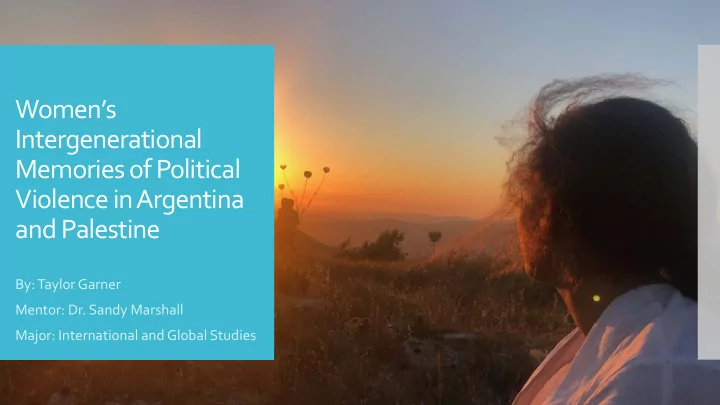

Women’s Intergenerational Memories of Political Violence in Argentina and Palestine By: Taylor Garner Mentor: Dr. Sandy Marshall Major: International and Global Studies
What does that mean?
Occupation of Palestine: 1967-present day Marginalized narratives in Argentina and Palestine Argentinian Dictatorship: 1976-1983
Women’s memories were largely excluded from the narrative
Buenos Aires, Argentina Nablus, Palestine
Semi- structured, ethnographic research
2. How do different 1. What are the generations of women different ways that keep and pass down women experience memories of violence? Research violence? Questions 4. How does putting 3. Do these memories these two contexts in mobilize women conversation socially or politically enlighten a larger and, if so, how? struggle?
There is not one woman’s experience
Three major themes: ü Experiencing violence ü Passing down memories ü Mobilizing women’s rights
Mothers leave the home to advocate for their children and families
“Ser como una mujer o morir como un hombre”
Transmitting Memories Argentinians pass down memories publicly Palestinians pass down memories privately Younger generations of Argentinians are still mobilized Younger generations of Palestinians just want a normal life Similarity: Importance of educating a peaceful future
“Keep struggling for rights, for a space for them, to live in dignity and equality, to build together a regime of justice and democracy. I was raised on these ideals; I want a more beautiful world.”
Women continue to gain more rights today, but within different spaces
Transnational Solidarity When you speak out, when you mobilize, you’re not only creating a space for yourself but for others to feel empowered and demand change.
Thank you. Gracias. ﺷﻛراً Contact me: Acknowledgements: § Mentor: Dr. Sandy Marshall taylorgarner84@gmail.com § Honors Fellows § Center for Global Engagement @taylorgarner97 § Dr. Vandermaas-Peeler § The Forum on Education https://womensmemorywor Abroad k.wordpress.com/
Recommend
More recommend